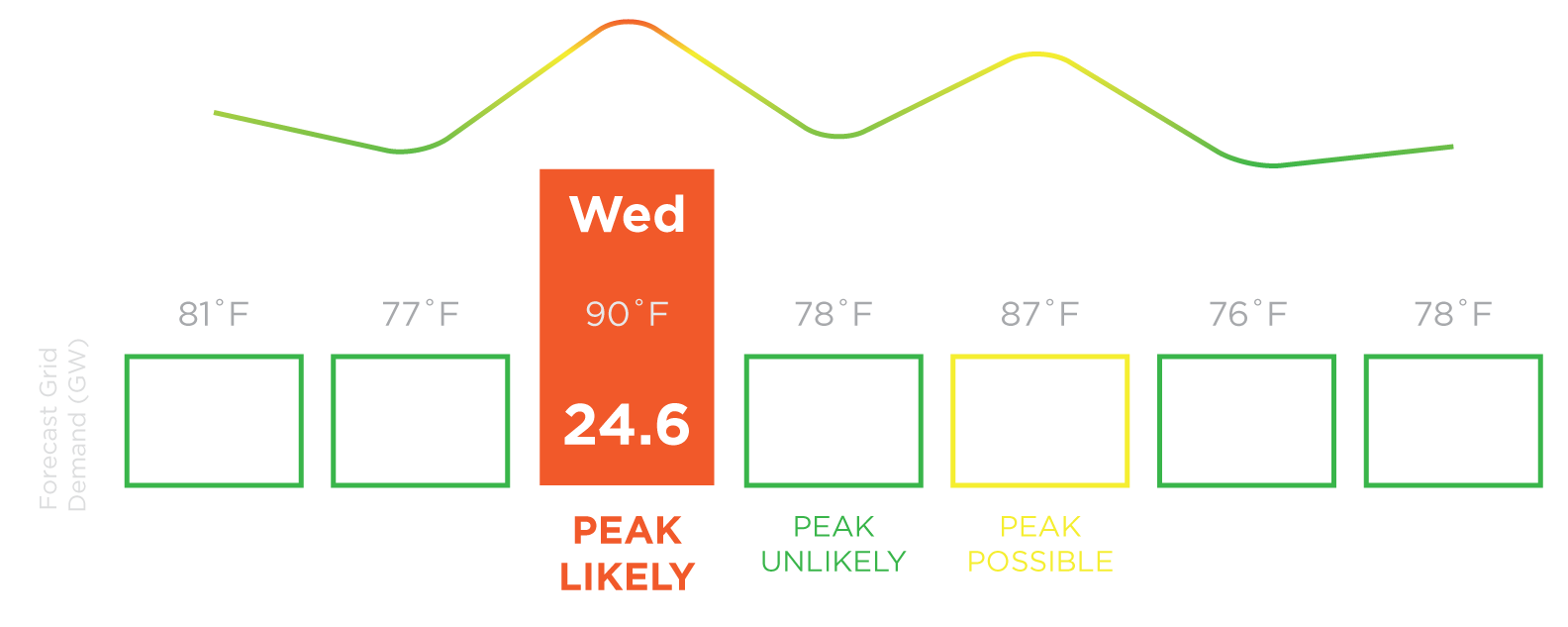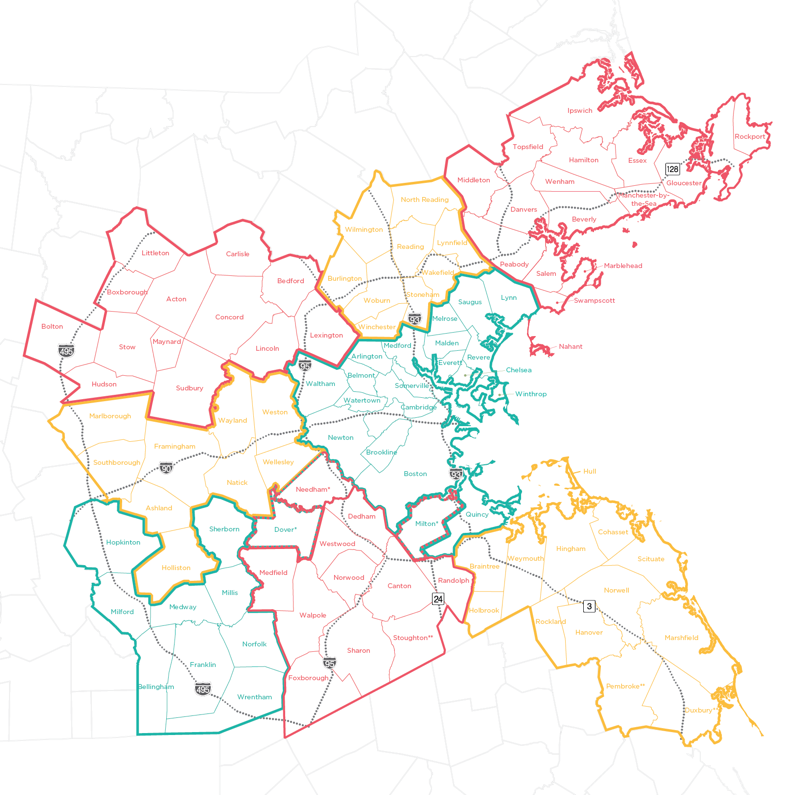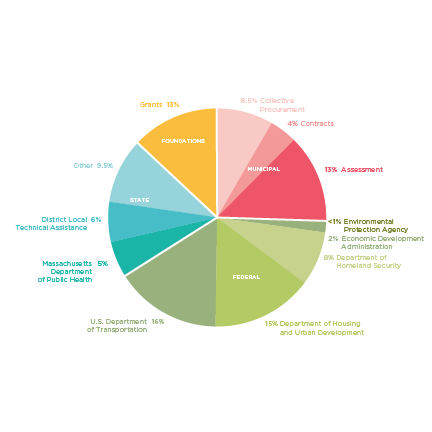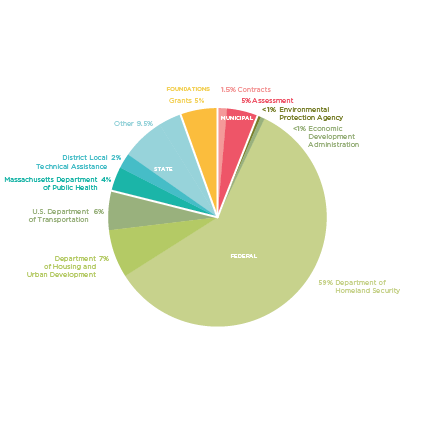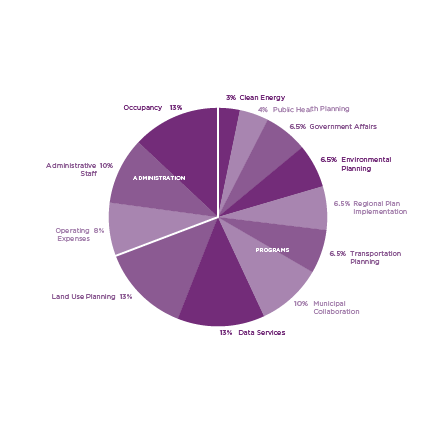TRANSPORTATION
This year, we also continued to place particular emphasis on empowering cities and towns to develop Complete Streets, which are roadways that are designed for everyone: safe, convenient and accessible for pedestrians, cyclists, transit users and motorists, and comfortable and barrier-free for people of every age and mobility level. Thanks in large part to our foundational work last year in helping municipalities to pass Complete Streets policies, which ensure that roads are inclusively designed, constructed, refurbished and maintained, this year we saw many cities and towns take up the work themselves, using the strong templates developed by MAPC in recent years and building on the momentum of Complete Streets’ wider acceptance as a best practice in design. This year, to varying degrees, we worked with Ashland, Beverly, Framingham, Lynn, Norwell and Weymouth to get Complete Streets policies crafted at the local level, and we look forward to helping even more cities and towns do so during this year and after.
Parking is a critical link between land use and transportation, and parking policies have a tremendous effect on transportation choices and the built environment. Effective parking strategies can also help cities and towns meet their goals around affordable housing, reducing pollution, improving residents' health and attracting good development. MAPC assists communities in turning parking challenges into assets. This year, one of the biggest parking projects we undertook happened in Downtown Malden, which is poised for transformative change with the redevelopment of City Hall and police headquarters across from the Malden Center MBTA station, where the city has already permitted hundreds of new units of housing and ground-floor retail. Our team undertook a comprehensive study and produced an engaging action plan Action Plan after surveying hundreds of residents, city employees, businesses and downtown patrons. Updates in pricing, enforcement and signage are already happening thanks to MAPC’s recommendations, with more changes coming over the next year or two. We hope that our approach to the Malden project can be replicated in future parking studies across the MAPC region.
When it comes to transportation planning, MAPC advocates for a system that supports concentrated development in areas with existing infrastructure over investments that encourage sprawl. To that end, MAPC helped develop the Boston Region Metropolitan Planning Organization’s (MPO) Long Range Transportation Plan in 2015, which identifies goals and objectives for the transportation system from 2015 to 2040, and also sets funding priorities. The greatest change the MPO made in this recent Long Range Transportation Plan is to focus more of the region’s federal highway funding on roadway projects that preserve existing infrastructure, increase safety, encourage complete streets and support walking and biking, over increased highway capacity or expansion. Find out more about the MPO and Long Range Transportation Plan here.
In Framingham, our staff worked with the Massachusetts Department of Transportation to develop a roadmap for bringing additional investment to the downtown area. Throughout the process, we relied heavily on community engagement techniques such as public forums, downtown business tours in partnership with local employers and community groups, social media, outreach to houses of worship, in-person canvassing, interviews on local cable access as well as Portuguese-language radio, and distributing flyers to families via the schools -- helping to increase participation and ensuring that often-disenfranchised and under-represented groups such as parents, non-English speakers, lower-income residents, youth and the elderly were able to have a voice in the planning process. In the Fall of 2015, the zoning recommendations made by MAPC were approved at Town Meeting, paving the way for much of the vision crafted in the project. Learn more at mapc.org/framinghamTOD.
We are hoping the zoning successes and inclusive civic engagement approaches used in Framingham can serve as a model for other transit-oriented development (TOD) projects in the year ahead, from Braintree to Natick Center and Dedham's Corporate Center station area.
In response to widespread demand for innovative strategies to improve traffic and commuting in the region, MAPC and MassCommute co-hosted a breakfast forum in October on Transportation Demand Management. Municipal leaders and employers gathered to discuss ways of working together on reducing congestion and improving our area's ability to attract and retain a competitive workforce through better transportation options. Staff from MAPC and MassCommute presented findings from two new research papers on transportation demand management. Visit mapc.org/tdm to view case studies and presentations from the forum.


